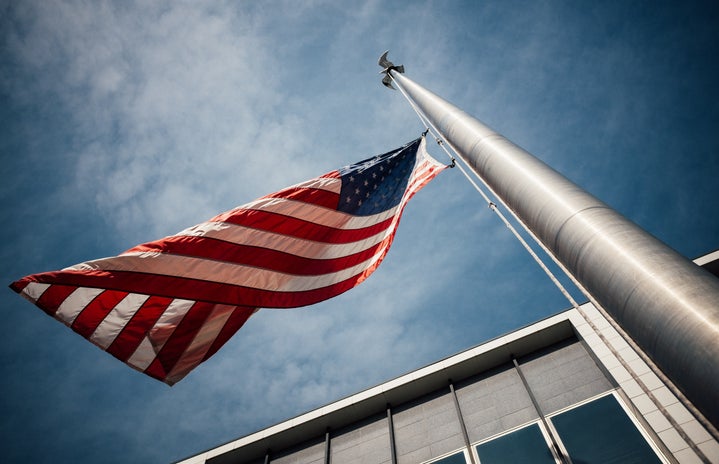On Tuesday, Nov. 5th, I woke up at 8 a.m. (much earlier than usual for me). I rolled out of bed, fed my cat, turned on Chappell Roan, and got ready to vote. I practically skipped out the door. The line to vote was not as long as I thought it would be. Maybe I’d arrived earlier than some of my peers. I cast my ballot and wore my sticker with pride for the rest of the day. What a privilege I had: I got to cast my first ballot voting for a candidate that would break records. Later that night, I anxiously sat in front of my friend’s TV in his apartment, tearing up.
I’d surrounded myself with political social media content. TikTok, Instagram, X, and Threads were filled with talk about the election and the candidates. I had heard all about the “red mirage” and the “blue shift,” so when Donald Trump was leading in the polls, I believed it was the “red mirage.” After a few hours, I started to lose hope. On Nov. 6th, at 5:35 a.m., it was official. Donald J. Trump would become the 47th president of the United States of America.
I am privileged. I’m a Christian white woman. My family has always been well off financially; my father is in the military, so he has never faced job instability of any form. My mother was a stay-at-home mom, so me and my siblings had the privilege of staying home with her instead of attending daycare. I went to the best schools my parents could afford. My parents would buy us new shoes and new clothes before school started every year. Growing up, I had everything I’ve ever wanted. As I’m writing this, however, I am terrified. Terrified for what the future may hold for other women around America. How am I supposed to sit in my privilege when there are women who have had their right to an abortion torn away? How am I supposed to watch as he strips away the Department of Education and the ability to receive student loans? Religion is infiltrating public schools. The Department of Veterans Affairs will make it more difficult for disabled veterans to receive benefits for injuries sustained overseas. Taxes will raise for the middle class. The Federal Student Aid Administration is in danger of shutting down, putting those that rely on student loans at risk. These are not just possibilities. These are already happening. Women are dying because they cannot access life-saving care in states where abortion is banned. Oklahoma is using Trump’s version of the Christian Bible in their public schools. How am I supposed to sit comfortably in my privilege? How are any of us supposed to?
I know how you feel: lost, dejected, and hopeless. I feel this way, too. Some of my professors cancelled classes on November 6th. It’s easy to lose yourself in the sadness and grief that might come with a previously extremist Trump administration. We cannot allow ourselves to sink into the heartbreak, though. We are not helpless. There is hope. One of Trump’s main running points has been returning political power to the states. While this has led to some horrible consequences, this also opens up the ability for the people to vote. Suddenly, the choices we make in our local elections matter a lot more. We have the power to decide what happens in our states. This power disappears if we do not participate, though.
As college students, the idea of jumping into local politics may seem daunting. The transition from high school to college is a large enough leap. However, it is more important now than ever to take that leap. Now, I’m not saying you need to go run for a town board position. Start by attending your local city council and board meetings. Get to know the people that are leading your community. Make an effort to learn more about your state’s Congressional representatives. Volunteer with local non-profit or political advocacy groups. This will give you hands-on experience with the issues directly facing your community. Your local community is the best place to begin making a difference. As you get more involved, chances are you’ll learn more about your state’s opportunities to get involved.
Still too scary? I get it, especially if you live in a state that does not align with what you believe in. Instead, turn toward your college community. Start attending Student Senate meetings. Vote on the issues that directly impact you and your education. Become a Student Senator after some time has passed. Join advocacy groups at your university. Getting involved in advocacy at your university will give you the same experience that volunteering with a local non-profit will give you. Promote literacy in children. Get involved in climate change prevention groups. Work with campus advocates for gender and racial equality. Protect LGBTQ+ rights. Find what you’re passionate about and use it. Fight against injustices in your city, whether they be financial, social, or academic.

Along with civic engagement, it’s important to remember that not all is lost. The USA had some major wins on November 5th. Sarah McBride, a state senator from Delaware, became the first transgender person elected to Congress. Both Colorado and Missouri voted to cement the right to an abortion in their state laws. For the first time in US history, two Black women will serve in the Senate at the same time: Angela Alsobrooks (Maryland) and Lisa Blunt Rochester (Delaware). Andy Kim (New Jersey) will become the first Korean-American senator. Tulsa, OK, elected their first Black mayor, Monroe Nichols. These wins are not meaningless. The people have voted on their state representatives. You can, too.
Fighting for what you believe in is hard, especially as a college student. You’re in college for an education, after all. You have classes to worry about, a social life to uphold, and peace to keep within yourself. But it’s harder to sit by and watch as extremists strip your future away. Get angry and do something about it. Make your name known. Become well-respected. Fight for the future of America. We were built on the ideals of life, liberty, and the pursuit of happiness. Uphold those ideals; not just for you, but for your ancestors and for your descendants. We are cheering you on.
Want to learn more about getting involved? Check out this article from Change.org. It’s filled with useful resources and information on how to increase your civic engagement. Community power: How to get involved in local politics · Change.org




